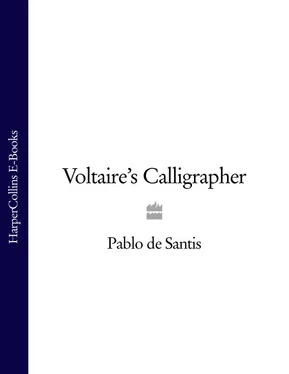I had never had any trouble with the little iron stove until one day (I was distracted, reading some licentious notes from Mme. F.) a spark set fire to a pile of correspondence from the marquis d’Argenson, a dear friend of Voltaire’s. I always carried a bag of sand for making quills and sometimes to use as a blotting agent, and threw it on the fire before it burned the archives to the ground.
I couldn’t sleep that night, knowing Voltaire would be deciding my fate: expulsion or servitude.
I went to his study at dawn. Through the window, a stand of dark trees mirrored my sadness, the wind bending them into question marks. Voltaire was examining a parasite he had found on one of his plants.
‘We must get rid of everything that consumes us, everything that lives at the expense of others,’ Voltaire said by way of greeting. ‘I want you to pack your bags.’
‘Can’t you give me some other job, instead of sending me away? Don’t you need a gardener?’
‘What do you know about plants? Whenever you go into the garden, the roses impale themselves on their own thorns and the tulips commit mass suicide.’
‘What about the kitchen?’
‘They would cook you, and I’m not sure I’d like that dish.’
I liked life at Ferney. I didn’t want to go back to climbing stairs at the courts, knocking on magistrates’ doors, waiting in paper-filled offices where the air was always stale. All the strength drained out of me as I thought about leaving, and while Voltaire stood tall in front of me, I grew old and stooped.
‘I’ll go pack now and never return,’ I said, feigning dignity and hoping for compassion.
‘What did you think I meant? I’m not firing you. I need you to get ready to leave, but to go to Toulouse.’
‘Why Toulouse?’
‘A traveler arrived last night and told me of a distressing case. He said the court of Languedoc is preparing to execute a Protestant named Jean Calas, and perhaps all of his family as well.’
‘What is he accused of?’
‘Of killing his son.’
‘Then I hope the sentence is carried out.’
‘And I hope you’ll find out why they’re determined to kill this man at all costs. I’ve prepared some briefs; you can read them on the way.’
‘But I’m a calligrapher. I care about the clarity of line, not the truth behind words. That’s for others to do; philosophers, for example.’
‘I’m too old to go. Besides, my reputation there guarantees it’s a shortcut to death. I’m in no hurry to die, much less in Toulouse. You, on the other hand, won’t be in any danger, as long as you never mention my name. I’ve already asked your uncle to send a coach for you.’
‘I thought I’d stay here, to write for you and for history, not travel with the dead.’
‘If your path is one of history, then it’s only natural to be accompanied by the dead.’
The old coachman, Servin, came from the Swiss side of the border this time. He was transporting a couple from Avignon who had been killed in an avalanche. The tragedy had occurred ten years earlier, but the bodies had only recently been found. They were accompanied by a third coffin, but I didn’t bother to ask about it.
Three hours into our trip it began to rain. Ahead were only shadows and darkened trees. I shouted to see whether Servin wanted me to take a turn, but he didn’t reply; he took another swig from his bottle and spurred on the horses, indifferent to the storm.
He soon told me to get some sleep so I could take over for him later. A small iron cot hung down inside the carriage above the three coffins. I crawled up into it, settled onto one blanket, and pulled another one over me. I fell asleep for a few minutes, despite the swaying bed and squeaking chains, but a sudden jolt woke me from a dream in which I was supposed to take Voltaire’s body to some faraway place. Seconds later a violent lurch tossed me into the air and onto the third coffin.
The shuttered viewing window snapped open, as if someone had answered my knock. I peered in at the third passenger with the help of intermittent lightning bolts. It was the same curiosity that had led me, as a boy, to stare at the hanged man’s blue tongue, the soles of his feet carved with unrecognizable symbols, and the superstitious old women patiently pulling his nails and teeth. I could already picture the unsightly powdered face when I saw her: she had been beautiful, and that hadn’t changed. Her features spoke not of death, but enchantment. I had found a secret door into a fairy tale.
I shouted for Servin to stop and waited for the storm to bring us another flash of lightning. The coachman didn’t bat an eye.
‘Sometimes a dry climate preserves a body intact.’
‘You call this rain a dry climate?’
‘Maybe they embalmed her the Egyptian way. They say there are funeral parlors in Geneva that cover a body in animal fat and replace the organs with sawdust.’
I wanted him to stay and discuss the enigma, but he went back to the reins, unburdened by the curiosity that leads one to search for answers and find only problems.
We hid the carriage behind a copse of trees and spent the night in an inn, keeping the nature of our cargo from the owner or she would never have let us stay: gravediggers, Night Mail coachmen, and executioners were generally unwelcome guests. It was still raining outside and there was a leak above my bed. I moved, but the drips followed me, reminding me there was still a mystery to be solved.
I lowered myself out through a window, being careful not to wake Servin. Inside the hearse, I used the lamp I had brought to illuminate the face behind the glass. The closer I brought the light, the darker it was all around. The woman’s lips were pursed, as if she were about to reveal a secret. No Egyptian technique was capable of such perfection.
The next morning Servin found me asleep on top of the coffin and woke me with a cuff on the head.
‘I’m going to tell the Maréchal. That’s all he needs, for you to fall in love with a passenger. You take the horses as far as Avignon.’
I let the horses take me. They seemed much wiser, their soft side-to-side motion indicating a philosophical acceptance of the world’s contradictions. I began to talk to them and was sure they understood by the way they would sometimes toss their heads, as if agreeing with my arguments.
The storm had ended by the time Servin took the reins again. I didn’t dare tell him I was lost, but one glance at the surrounding forest and the old coachman immediately turned the horses around. He found the road to Avignon, delivered the two bodies from the Alps, and pocketed an enormous tip. He gave me less than a tenth, but promised I would earn a little more once we reached Toulouse.
Whenever we passed through a town to replenish our food supplies, residents would close their windows and cross their fingers: the passing of a Night Mail coach was a bad omen. Twice we were refused entrance and forced to go another way. I tried to convince Servin to remove the black crêpe and carved allegorical images that decorated the hearse. Without these, it would look like any other carriage, but he refused.
‘Maréchal Dalessius personally decorates each coach and no changes are allowed. He wants us to be recognized from afar. Alternate routes and delays shouldn’t concern us. As he says: A detour is just another road.’
I had been eager to arrive but now that the wheels (about to take one last turn before falling off their axles) were shakily tracing the route to Toulouse, I felt that mixture of exhaustion and unease that comes over a traveler whenever he reaches a new city.
We delivered the last coffin to the rue des Aveugles. The house belonged to M. Girard, a toy manufacturer. A long table displayed wooden horses painted blue, puzzles of city maps, porcelain dolls, and armies of tin soldiers that seemed to be returning in defeat: broken, hungry, their flag in tatters.
Читать дальше












